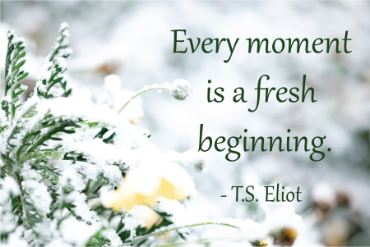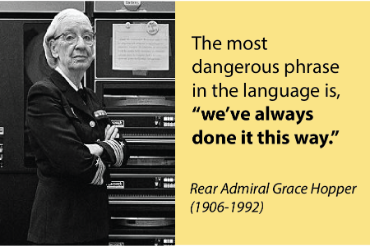Welcome to 2021! We hope you had a restful and rejuvenating bit of time off for the holidays. As we step into the new year, we can reflect on the past and gaze into the future. Learning from what has happened helps inform new plans for engaging in our work.
Throughout the next few months, we are highlighting evidence-based practices in our Third Thursday conversations that can help guide these new opportunities. We look forward to working with you this year!

Rethinking our practices: "We've always done it this way!"
Have you ever questioned why a practice was in place, only to be told, “We’ve always done it this way”? Did the discussion continue, or was the door to conversation closed shut, essentially hitting the proverbial ‘stone wall’?
Rear Admiral Grace Hopper said that “We’ve always done it this way” is “the most dangerous phrase in the language”. As a pioneering computer scientist in the 1940’s she assisted with the development of the first commercial computer. She designed the first code written in English, believing that the computer had capacity to change the language to symbols. Her creation ultimately became COBOL, a computer language still used today.

Her success underscores the power of looking forward, rather than backward, when confronting a challenge. As teachers and school teams across our state work to increase access to CTE courses for students with disabilities, it is necessary to eliminate artificial barriers. Instead, practices that open wide the doors to support access for all need to be developed. Questioning our past practices is an integral part of that process.
In Washington state, brave and innovative educators are abandoning the well-worn pathways named “we’ve always done it this way” to forge new highways, widening the opportunity for inclusive practices for all students. Listen as Ridgefield’s Federal Programs Director, Tiffany Gould, and High School Principal, Kristen Palmer, discuss eliminating barriers to participation in CTE courses. This video clip on Processes and Practices is from a discussion in our October Seminar, Voices from the Field (10:11-12:05).
Additional videos and presentation materials from Voices from the Field are available on the IPP Resources page. 
2021 Events
- IPP Third Thursdays are informal conversations designed to connect with others focused on inclusionary practices, provide technical assistance, and facilitate action plan development.
- Teams of special education and CTE instructors are encouraged to attend together.
Increasing Access to CTE Classes
Jan. 21, 2021; 3-4 p.m. PST
As we look to increase access to CTE courses, examining potential barriers to access can be an effective strategy. What barriers may prevent students from accessing classes that can be eliminated? Join us for an informal conversation to share your strategies and learn from the best practices of other educators.
Co-teaching with CTE
Feb. 18, 2021; 3-4 p.m. PST
One of the most common strategies for inclusion is co-teaching, in academic and CTE classrooms. What does co-teaching look like in CTE classrooms? What practices support its effectiveness, and what pitfalls should be avoided? Join us for an informal conversation to share your strategies and learn from the best practices of other educators.
Collaboration
March 18, 2021; 3-4 p.m. PDT
Quality collaboration improves student outcomes and improves educators. What strategies do you find effective for collaboration? How does your team find time for quality collaboration? Join us for an informal conversation to share your strategies and learn from the best practices of other educators.
Designing the Change
April 22, 2021; 3-4:30 p.m. PDT
Designing the Change is the culminating seminar of the 2020-21 CCTS Inclusionary Practices Project, focusing on increasing inclusionary practices in general education and partnerships between Special Education and CTE classrooms.
Guided by a panel of professionals in the field, participants in this seminar will work through the Managing Complex Change process and design a plan to implement increased inclusionary practices. Wherever you are on your inclusionary practices journey, we hope you will join us!
Participation in previous IPP seminars is not a requirement to attend. For your reference, presentation materials from Seminar 1: Catching the Vision, and Seminar 2: Voices from the Field, are available on the CCTS Inclusionary Practices Resources page.
Planning for Next Steps
May 20, 2021; 3-4 p.m. PDT
With this year ending and the beginning of next year in sight, what is your plan to increase inclusive efforts in your classroom, your school, your district? How will you develop, or enhance a culture of inclusion? What structures need to be put into place? What skills need to be developed? Is there a practice you want to implement? Join us for an informal conversation to share your strategies and learn from the best practices of other educators.

Past Training Materials and Recordings
Slide decks and captioned recordings from CCTS trainings are available online under Inclusionary Practices Resources. Topics include:
- Accommodations 101
- Aligning High School and Beyond Plans and IEPs
- CTE and Special Education Partnerships
- Effective Collaboration
- Finding Your CTE Data
- T-Folio 101+
- ...and more!

Don't miss the latest CCTS IPP updates!
